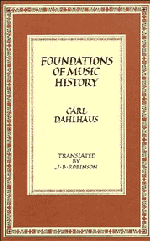Book contents
- Frontmatter
- Contents
- Translator's preface
- Foreword
- 1 Is history on the decline?
- 2 The significance of art: historical or aesthetic?
- 3 What is a fact of music history?
- 4 Does music history have a ‘subject’?
- 5 Historicism and tradition
- 6 Hermeneutics in history
- 7 The value-judgment: object or premise of history?
- 8 The ‘relative autonomy’ of music history
- 9 Thoughts on structural history
- 10 Problems in reception history
- Bibliography
- Index
Translator's preface
Published online by Cambridge University Press: 01 June 2011
- Frontmatter
- Contents
- Translator's preface
- Foreword
- 1 Is history on the decline?
- 2 The significance of art: historical or aesthetic?
- 3 What is a fact of music history?
- 4 Does music history have a ‘subject’?
- 5 Historicism and tradition
- 6 Hermeneutics in history
- 7 The value-judgment: object or premise of history?
- 8 The ‘relative autonomy’ of music history
- 9 Thoughts on structural history
- 10 Problems in reception history
- Bibliography
- Index
Summary
Professor Dahlhaus has handled a complex topic with a light touch and enormous vitality, yet the English-speaking reader may find parts of his argument rather inaccessible. There is a simple reason for this: the author is building upon the philosophical tradition of German idealism, which not only developed independently of the Anglo-American analytic tradition but in many ways stands diametrically opposed to it. The reader of the German edition is likely to understand something more or less specific by the term Verdinglichung, a concept exhaustively analysed by Hegel, Marx and their successors. What, however, will the English-speaking reader make of its exact English equivalent, ‘reification’? Probably nothing. Nor will it help if he has been trained in analytic philosophy, where this term serves entirely different purposes in contexts such as ‘reification of universals’. The terminology of the German idealist tradition in philosophy has yet to find its way comfortably into our language. Entire families of concepts such as Entäusserung, Verfremdung, Entfremdung, Vergegenständlichung and the like, with all their many shades of meaning, have at one time or another been translated into that overworked and by now practically meaningless word ‘alienation’. Even so fundamental a distinction as subject versus object has yet to take hold in our educated discourse: we refer to the ‘subject’ of contemplation, or the ‘subject’ of a study, where German speakers, relying on a distinction at least as old as Hegel, would use the word Objekt, reserving Subjekt for the person doing the contemplating or studying.
- Type
- Chapter
- Information
- Foundations of Music History , pp. vii - xPublisher: Cambridge University PressPrint publication year: 1983

